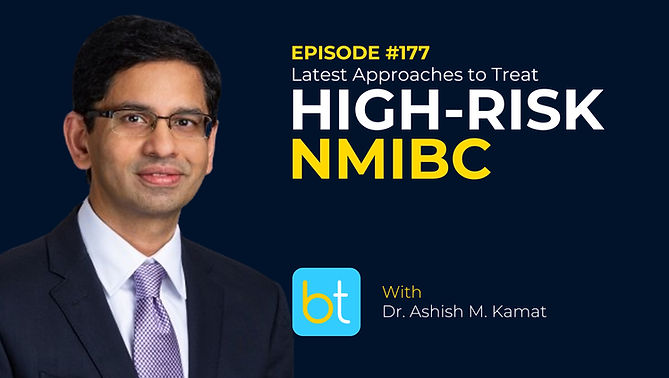BackTable / Urology / Podcast / Episode #177
Latest Approaches to Treat High-Risk NMIBC
with Dr. Ashish Kamat
Dr. Ashish Kamat discusses contemporary management of high-risk, non-muscle-invasive bladder cancer (NMIBC) and his thoughts into the future of this arena.
This podcast is supported by:
Be part of the conversation. Put your sponsored messaging on this episode. Learn how.

BackTable, LLC (Producer). (2024, July 9). Ep. 177 – Latest Approaches to Treat High-Risk NMIBC [Audio podcast]. Retrieved from https://www.backtable.com
Stay Up To Date
Follow:
Subscribe:
Sign Up:
Podcast Contributors
Synopsis
Dr. Kamat explores the evolving role of BCG and potential alternative therapies such as gemcitabine and docetaxel. He also covers effective clinical management, emerging clinical trials, and nuanced decision-making principles for radical cystectomy. Finally, the conversation touches on Dr. Kamat’s expert insights regarding the future of NMIBC management, including predictive biomarkers and personalized medicine.
Timestamps
00:00 - Introduction
03:56 - Initial Diagnosis and Workup
12:22 - High-Grade Bladder Cancer
22:37 - BCG and Alternative Treatments
31:30 - BCG Unresponsive Disease
36:56 - Novel Intravesical and Systemic Therapies
46:45 - Future Directions
Resources
Related BackTable episodes:
https://www.backtable.com/shows/urology/podcasts/64/management-of-bcg-refractory-nmibc
https://www.backtable.com/shows/urology/podcasts/157/the-bladder-cancer-matters-podcast
https://www.backtable.com/shows/urology/podcasts/103/adjuvant-therapy-for-high-risk-bladder-cancer
Transcript Preview
[Dr. Ashish Kamat]
It’s an exciting time to study bladder cancer. Predictive and prognostic diagnostic markers are where we need to focus our energies. There’s urinary ctDNA; we've used FISH for many years and now we are trying to couple that with response to newer agents. I think the ability to figure out which drug will work for what patient should be the next goal, because there's no clear winner. The personalized response rate is key when you offer the patient many different treatments. We have machine learning tools, AI-guided pathology, and genome sequencing. The bottom line is analyzing the data to figure out a marker that predicts the best drug for each patient.
The Materials available on BackTable are provided for informational and educational purposes only and are not a substitute for the independent professional judgment of a qualified healthcare professional in diagnosing or treating patients. Any opinions, statements, or views expressed are those of the individual contributors and do not necessarily reflect those of the publisher, platform, or any affiliated organization.















